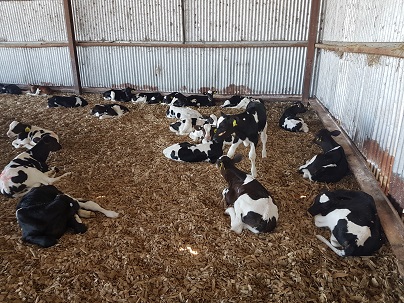Rumen Drinking

What is Rumen Drinking?
When the reticular or oesophageal groove reflex fails to direct milk into the abomasum, and allows it to flow into the rumen. The oesophageal groove is a muscular structure in the stomach which senses milk and closes, preventing milk from entering the rumen. Milk that enters the rumen is fermented to lactic acid decreasing rumen pH and causing inflammation in the lining of the rumen.
When this happens regularly, the gut becomes irritated and thickens. Thickening of the gut wall reduces the stomach’s ability to contract and absorb nutrients causing malnutrition and bloat. The resultant lactic acid is absorbed into the calf’s system causing depression and weakness.
The sucking of bottles or teats stimulates the nervous system which in turn causes the muscles of the oesophageal groove to close, directing milk to the abomasum. Only milk stimulates this response, not water. This function of the oesophageal groove diminished after weening. It is milk dependant.
Causes of Oesophageal Groove Dysfunction
Early calf hood diarrhoea, gulping milk from a bucket or teat that has a worn end, tube feeding which bypasses the groove and milk goes straight into the rumen. Management factors like irregular feeding times, low quality milk replacer, cold milk and stressors such as long distance transport. I hasten to add, tube feeding colostrum in the first 24 hours will not cause this problem. At that stage, the calf rumen has a capacity of about 170 ml, so feeding 4 litres of colostrum by tube, most will overflow into the abomasum, and the new-born rumen has no bacteria at this stage.
Stress is a primary cause of rumen drinking; changes in routine and feeding method, especially with bucket feeding, prolonged transport and any human induced stress. Signs of rumen drinking may not appear for a few weeks after the stress event. Secondary causes include disease that induces pain, distress or fatigue. The underlying disease such as scours or respiratory disease may mask rumen acidosis from rumen drinking.
Signs of Acidosis Due to Rumen Drinking
Calf appears to be in pain – teeth grinding, shifting from one foot to another, arching of back and off feed. Bloated and distended abdomen, dehydration due to diarrhea, poor growth, lethargy, hair loss and clay like feces.
Prevention and Treatment
Recovery of calves chronically affected is poor, so prevention is the better strategy. Rapid detection of sick calves and treatment for secondary causes (scours & respiratory disease). Consistency in feeding including temperature of milk, minimising tube feeding of milk. Calves that are suspected to be rumen drinkers need to be fed smaller amounts of milk in more frequent meals. If the calf becomes sick from rumen drinking, tube administration of warm electrolytes will buffer the acid accumulated in the rumen. Do not tube feed calves past 24 hours after birth.
CALFMAX
CALFMAX is a soluble combination of an ultra-concentrated blend of Hydrolysed yeast, yeast extract, yeast culture for addition to calf milk
It contains MOS, Glucans, Galactosamine, Vitamins, Minerals & BOVATEC
CALFMAX is available directly from Dairytech Nutrition or at the following Rural Stores:
South West Vic
Alansford Acme Rural Supplies
Colac The Co-op Colac
Noorat Mt Noorat Farm Supplies
Simpson E&RA Parlour & Co
Terang Scanlon’s Dairy Centre and Terang Co-op
Gippsland
Leongatha Brown’s Stockfeeds
Lang Lang Larmax Agribarn
Poowong Poowong Dairy & Hardware
Drouin Evison Grain & Produce
Yarragon Yarragon Rural Supplies
Northern Victoria
Cohuna J&R Cooke Trading P/L
Echuca Kober Ag Intellegence
Kyabram Dunstall Rural Supplies
Girgarre Dunstall Rural Supplies
Leitchville Lipps Leitchville
Tongala GTS Farm Supplies
If there are no stockists near you, call Dairytech Nutrition on 0400 991 814
For information and supply of CALFMAX call Dairytech Nutrition 0400 991 814.